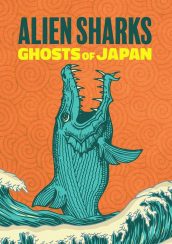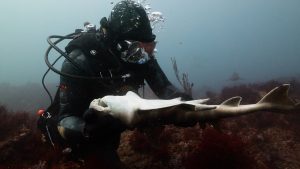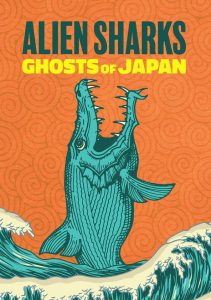John Cena hosts Discovery/Discovery+ Channel’s thirty-sixth annual SHARK WEEK, running this year from July 7 through July 13.
One of the regular features of SHARK WEEK is ALIEN SHARKS, which explores endangered and unusual creatures. This year’s installment, ALIEN SHARKS: GHOSTS OF JAPAN, is set in the waters off that nation. The special follows the quest of the Discovery team to find the rare Japanese angel shark.
Wildlife biologist Forrest Galante, a host on both Discovery+ and Animal Planet, was part of the GHOSTS OF JAPAN team. Galante has been witness to a lot of events seldom captured on camera. On last year’s ALIEN SHARKS: STRANGE NEW WORLDS, Galante and company were able to film striped pajama sharks mating and even enjoying being tickled by humans.
This year, while seeking the Japanese angel shark, Galante and the Discovery crew got two large velvet dogfish sharks on board the ship’s deck, with the intention of examining the animals and then returning them unharmed to the ocean. This did eventually happen, but not before both sharks proceeded to give live birth, virtually on top of Galante. (While some sharks do lay eggs, most give live birth; the babies are called pups.) To put it mildly, this was not something Galante had been expecting, much less gone through before.
“That was a first,” Galante acknowledges. “It was not until after the fact that it really hit me how unique that experience was, and how incredible it was. If you had given me a list of a million things to state that I would have done with sharks, being a shark midwife was never going to make that list. So, I was utterly shocked, and it was a phenomenal experience, great for science, great for research and understanding, and of course, the fact that the babies were born healthy, well and alive, and able to be re-released was massively cool. There’s no other word for it. It was just unbelievably cool, and I was thrilled.”
As the SHARK WEEK audience is only privy to what that the filmmakers want to share, were there any unincluded moments of the scientists wondering what they ought to do about the sudden transformation of their research area into a shark maternity ward?
“Not really, not around the shark birth, anyway,” Galante replies. “I have been working with wildlife long enough that I think it’s pretty instinctual for me when something unexpected happens, which basically it always does with wildlife, to just make choices that are maybe not always the right choice, but to at least act. You can’t sit there and go, ‘What do we do?’ while there are baby sharks basically drying up on the deck of a boat. So, we just had to act. We had to get them in the water.”
Fortunately for all concerned, there were already tanks set up on the deck so that the scientists could safely and briefly study the adult sharks. “What you don’t see in the show is that we have a whole chilling system and a pumping system, so that there’s fresh [sea]water constantly flowing over to acclimate the sharks to the surface, so that we can then re-release them safely. So, it was just ‘act.’ And at the end of the day, it’s just instincts, right? Sharks being born? Put them in water. It’s not rocket science. You just do the right thing to try and save them.”
It helps, Galante adds, that “they’re such tough animals. Something that we probably didn’t harp on enough in the show is the resilience of these deep-sea sharks is incredible. They live under such extreme conditions that they have to be really tough, hardy creatures. And I think that was really evident with these babies, because they came out formed up and were ready to go. It was amazing.”
At the beginning of ALIEN SHARKS: GHOSTS OF JAPAN, it is stated that one-third of all species of sharks on Earth live near Japan. Is it known why this is the case?
“Yeah,” Galante responds. “It’s specifically because of a confluence of perfect situations. They get a ton of nutrient runoff from Mount Fuji, and all the rain and the weather. You get a ton of upwelling from the deep sea and the close Continental Shelf, really good mixing of currents, and it just creates this perfect storm that allows for the highest diversity of anywhere in the world. It’s actually a scientific hypothesis known as the ‘intermediate disturbance hypothesis.’ So, just the right amount of disturbance of all these different conditions allows for a high diversification in speciation, which is why we get to see so many incredible species there.”
The Japanese angel shark is now profoundly endangered. Is this because they were specifically targeted by fishermen for so long, or are other factors involved as well?
“I don’t know the exact answer,” Galante says. Although Japanese angel sharks blend in effectively with its surroundings on the ocean floor, they tend to readily take bait. “The reality is that it’s a species that is very, very easy to target and catch, because it lays on the bottom and bites anything that comes in front of it. It has a relatively small distribution; it’s not globally spread, so it doesn’t have a lot of places to hide. And it’s susceptible to fishing pressure, because it’s a great predator. So, when you combine all those things, it’s easy to knock them out pretty quickly.”
By now, though, it’s hard to catch a Japanese angel shark – or even locate one. “That’s what my team and I do is, we look for animals that are just very, very challenging to find, because of their edge of extinction status. And the Japanese angel shark, being critically endangered, is no different.”
Something we see in ALIEN SHARKS: GHOSTS OF JAPAN are large amounts of deep-water animals, including sharks, being more active at night. But since they are normally so far down, it seems like sunlight or lack of it would not be very visible where they are. So, what accounts for the nocturnal activity?
Galante reveals that the lack of illumination makes the surface more like the depths, and thus a better time for predators to hunt. “The largest migration in the world takes place every single night, when the sun sets, and animals from the deep sea actually rise to the surface, and then, as the sun rises, they go back down. It’s much larger than the Masai Mara, the great wildebeest migration, everything. It’s called a vertical migration. It is the largest migration on the planet.
“Pressure, light, moon phases – there’s all kinds of reasoning behind it. But how and why that happens is somewhat of an unknown, but basically, under the cover of darkness, things feel safer, and they’re able to come up shallower, and head back down. And so, you get to see more deep-sea creatures up near the surface at night, which is incredible, and no more evident than that was our night dive, which we were not expecting to see all of the incredible creatures that we did, and it was phenomenal.”
Does Galante have a favorite species of shark? “Until recently, I probably would have said no, but last year, on ALIEN SHARKS: [STRANGE NEW WORLDS], the striped pajama sharks, were so, for lack of a better term, affectionate and cuddly that I think they’ve quickly risen to the top of my list of favorite species.”
What does Galante most want viewers to get out of ALIEN SHARKS: GHOSTS OF JAPAN?
“Just knowing that the general Western consensus is, Japan’s seas are barren because of their immense fishing practices, and how just incredibly successful they are at capturing sharks and fish in general. I hope that people take away from this show, ‘Look at how vibrant and incredible little pockets of protected Japan are.’
“Nobody that I know has actually gone to Japan to go diving and to go sightseeing the way that we did, and I hope that more people in the world can understand that Japan’s ocean is unbelievable, and this show really speaks to the resilience of sharks and species, when protected in small areas, how they can thrive, including the Japanese angel shark.”
Related:SHARK WEEK: 6000 LB. SHARK: Researcher Tom Hird on new shark documentary – Exclusive Interview
Related:SHARK WEEK: Shark expert Paul de Gelder on his five different specials – Exclusive Interview
Follow us on Twitter at ASSIGNMENT X
Like us on Facebook at ASSIGNMENT X
Article Source: Assignment X
Article:SHARK WEEK: ALIEN SHARKS: GHOSTS OF JAPAN: Researcher Forrest Galante on Discovery Channel documentary – Exclusive Interview
Related Posts:













